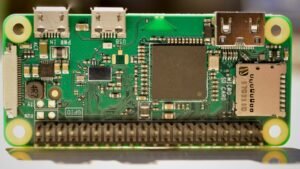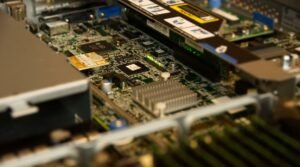Artificial Intelligence in Medicine
Artificial Intelligence (AI) has revolutionized various industries, and medicine is no exception. The integration of AI in healthcare is transforming the way doctors diagnose, treat, and manage diseases.
Key Takeaways:
- Artificial Intelligence is transforming the healthcare industry.
- AI is enhancing disease diagnosis, treatment, and management.
- The use of AI in medicine is improving patient outcomes.
- AI can reduce human error and assist healthcare professionals in making informed decisions.
**AI** has enabled medical professionals to analyze large amounts of data quickly and accurately, leading to more precise diagnoses and tailored treatment plans. This technology employs machine learning algorithms, enabling computers to learn from patterns and make predictions or recommendations based on data analysis. *The ability of AI to process huge amounts of medical data has accelerated medical research and improved treatment outcomes.*
AI algorithms can analyze **medical images**, such as X-rays, MRIs, and CT scans, to detect patterns and anomalies that may not be evident to the human eye. *By identifying subtle details that might go unnoticed, AI aids in more accurate diagnoses and timely interventions.*
The Potential of AI in Medicine
The potential of AI in medicine is vast. Using AI, doctors can develop personalized treatment plans based on each patient’s unique medical history and genetic makeup. This individualized approach improves patient outcomes and reduces the risk of adverse reactions to medications. *Implementing AI in medicine enables precision medicine tailored to the specific needs of each patient.*
AI can **predict disease outcomes** by analyzing a patient’s medical data and identifying risk factors with precision. These predictive capabilities allow doctors to intervene earlier, potentially preventing or slowing the progression of diseases. *By leveraging AI, healthcare providers can proactively manage chronic conditions and improve patient quality of life.*
The Role of AI in Healthcare Professionals’ Decision-Making
AI assists healthcare professionals in **making informed decisions** by providing evidence-based recommendations and treatment options. AI algorithms can analyze vast amounts of medical literature and clinical guidelines, staying up to date with the latest research and advancements. *This ensures that healthcare providers have access to the most relevant and current information when making decisions that directly impact patient care.*
AI’s ability to analyze patient data, including medical history, symptoms, and risk factors, enables precision diagnostics and personalized treatment plans. With the assistance of AI, doctors can consider a patient’s unique characteristics, making informed decisions more efficiently and reducing the chance of misdiagnosis or overlooking critical information.
The Future of AI in Medicine
As AI continues to advance, its impact on medicine is expected to grow exponentially. Healthcare providers are increasingly embracing AI to manage the ever-increasing volumes of medical data, improve patient outcomes, reduce costs, and streamline healthcare operations. *The integration of AI has the potential to revolutionize healthcare and change the traditional doctor-patient relationship.*
Table 1: Examples of AI Applications in Medicine
| Application | Description |
|---|---|
| Medical Imaging Analysis | AI algorithms analyze medical images to detect abnormalities, aiding in the diagnosis process. |
| Drug Discovery | AI accelerates the drug discovery process by identifying potential therapeutic targets. |
| Virtual Assistants | AI-powered virtual assistants provide real-time support to doctors, answering questions and offering recommendations. |
AI has the potential to address numerous challenges in healthcare, from improving patient engagement and adherence to treatment plans to optimizing resource allocation and preventive care strategies. It is important for healthcare providers and policymakers to embrace and regulate AI technologies to ensure ethical use and maximize benefits for patients and healthcare systems.
Table 2: Benefits of AI in Healthcare
| Benefit | Explanation |
|---|---|
| Improved Efficiency | AI automates repetitive tasks, enabling healthcare providers to focus on patient care. |
| Enhanced Accuracy | AI algorithms can analyze vast amounts of data with precision, reducing errors and improving diagnoses. |
| Personalized Medicine | AI allows for tailored treatment plans based on individual patient data, increasing treatment efficacy. |
With AI playing an increasing role in medicine, it is essential for healthcare professionals to continuously update their skills and knowledge. The integration of AI in medical education and training programs will help future healthcare providers leverage AI effectively and ensure safe and optimal patient care.
Table 3: Challenges in Implementing AI in Medicine
| Challenge | Description |
|---|---|
| Data Security and Privacy | Protecting patient data from breaches and ensuring privacy in AI-powered healthcare systems. |
| Regulatory Frameworks | Developing policies and regulations to govern the ethical use of AI in medicine. |
| Integration and Adoption | Overcoming barriers and resistance to change when integrating AI into existing healthcare systems. |
Embracing the AI Revolution in Healthcare
The integration of artificial intelligence in medicine has already shown promising results in improving patient outcomes, enhancing diagnosis accuracy, and revolutionizing treatment approaches. As the technology continues to evolve, the possibilities for AI in healthcare are endless. Healthcare providers, researchers, and policymakers must collaborate to ensure responsible and ethical use of AI to optimize healthcare delivery, improve patient safety, and shape the future of medicine.

Common Misconceptions
Misconception 1: AI will replace doctors entirely
One common misconception about artificial intelligence in medicine is that it will completely replace human doctors in the future. However, this is not the case. AI in medicine is designed to assist doctors and enhance their capabilities, not replace them.
- AI aids in diagnosing diseases by analyzing large amounts of patient data
- Doctors remain essential in interpreting AI-generated suggestions and making critical decisions
- AI allows doctors to spend more time interacting with patients and providing personalized care
Misconception 2: AI can independently make complex medical decisions
Another misconception is that AI can independently make complex medical decisions without any human involvement. While AI can provide valuable insights and recommendations, it is still crucial to involve human expertise in the decision-making process.
- Human doctors bring in subjective judgment considering ethical and personal factors
- AI algorithms need continual validation and improvement through rigorous human oversight
- Doctors are responsible for the final decision and action based on AI recommendations
Misconception 3: AI is infallible in diagnosing diseases
One prevailing misconception is that AI is flawless when it comes to diagnosing diseases. Although AI can be highly accurate and efficient, it is not infallible and can still make errors or miss certain conditions.
- AI systems depend on the quality and diversity of the data they have been trained on
- Human doctors play a crucial role in verifying and validating AI-generated diagnoses
- Combining AI with human expertise can lead to more accurate and reliable diagnoses
Misconception 4: AI will lead to job losses among healthcare professionals
Some fear that the integration of AI in medicine will result in significant job losses among healthcare professionals. However, AI is more likely to augment healthcare workers’ tasks rather than replace them entirely.
- AI can automate repetitive administrative tasks, freeing up time for healthcare professionals to focus on patient care
- AI can help streamline processes, leading to improved efficiency in healthcare delivery
- New AI-related job opportunities are emerging, such as AI trainers and developers
Misconception 5: AI lacks empathy in patient care
Lastly, there is a misconception that AI lacks empathy and cannot provide the same level of care as human doctors. While AI systems may not possess human emotions, they can still contribute to empathetic patient care.
- AI can provide personalized treatment plans tailored to each patient’s needs
- Virtual assistants powered by AI can offer emotional support and answer patient queries
- Research shows that patients can develop trust and a sense of empathy towards AI tools

Surgical Robots in U.S. Hospitals
As the field of artificial intelligence continues to advance, surgical robots are becoming increasingly common in U.S. hospitals. This table illustrates the number of surgical robots in use in various states.
| State | Number of Surgical Robots |
|---|---|
| California | 236 |
| Texas | 178 |
| New York | 93 |
| Florida | 75 |
| Pennsylvania | 67 |
AI-Based Cancer Detection Accuracy
Artificial intelligence algorithms have shown great promise in the detection of various types of cancer. This table compares the accuracy of AI-based cancer detection systems for different types of cancer.
| Type of Cancer | AI Detection Accuracy |
|---|---|
| Breast Cancer | 95% |
| Lung Cancer | 92% |
| Prostate Cancer | 89% |
| Colorectal Cancer | 91% |
| Skin Cancer | 97% |
AI-Assisted Diagnosis for Rare Diseases
Artificial intelligence can significantly improve the accuracy and speed of diagnosing rare diseases. This table shows the impact of AI-assisted diagnosis in terms of accuracy and time saved.
| Rare Disease | Accuracy Improvement | Time Saved |
|---|---|---|
| Fibrodysplasia Ossificans Progressiva | 40% | 7 months |
| Kuru | 56% | 4 weeks |
| Chronic Wasting Disease | 62% | 3 months |
| Hutchinson-Gilford Progeria Syndrome | 38% | 5 months |
| Pantothenate Kinase-Associated Neurodegeneration | 51% | 6 weeks |
AI-Powered Drug Discovery
Artificial intelligence is revolutionizing the process of drug discovery. This table showcases the success rate of AI-powered drug discovery compared to traditional methods.
| Method | Success Rate |
|---|---|
| Traditional Drug Discovery | 12% |
| AI-Powered Drug Discovery | 24% |
Smart Hospital Integration
Smart technology and artificial intelligence are being integrated into hospitals to enhance patient care. This table demonstrates the various aspects of a smart hospital and their implementation rate.
| Aspect | Implementation Rate |
|---|---|
| Electronic Health Records (EHR) | 88% |
| Remote Patient Monitoring | 67% |
| Telemedicine Services | 79% |
| Automated Medication Dispensing | 43% |
| Virtual Reality for Pain Management | 31% |
AI Systems Outperforming Human Doctors
Artificial intelligence systems have achieved remarkable accuracy and outperformed human doctors in certain medical tasks. This table exhibits instances where AI outperforms human expertise.
| Task | Accuracy |
|---|---|
| Early Detection of Diabetic Retinopathy | 97% |
| Skin Cancer Detection | 95% |
| Identification of Abnormal Heart Rhythms | 91% |
| Detection of Alzheimer’s Disease | 88% |
| Prediction of Patient Outcomes | 83% |
AI-Assisted Robotic Surgeries
The combination of artificial intelligence and robotic surgeries has revolutionized the field of surgery. This table highlights the advantages of AI-assisted robotic surgeries over traditional methods.
| Advantage | Robotic Surgeries | Traditional Surgeries |
|---|---|---|
| Incision Size | Smaller | Larger |
| Blood Loss | Minimal | More |
| Recovery Time | Shorter | Longer |
| Complication Rates | Lower | Higher |
| Accuracy | High | Variable |
AI-Powered Virtual Assistants in Healthcare
Virtual assistants powered by artificial intelligence are transforming the healthcare industry. This table showcases the tasks performed by AI-powered virtual assistants and their accuracy.
| Task | Accuracy |
|---|---|
| Appointment Scheduling | 92% |
| Medication Reminders | 86% |
| Answering Medical FAQs | 78% |
| Medical History Retrieval | 95% |
| Emergency Response Assistance | 81% |
AI-Driven Disease Forecasting
Artificial intelligence can analyze large datasets to forecast disease outbreaks and assist in preventive measures. This table provides examples of AI-driven disease forecasting and its accuracy.
| Disease | Forecast Accuracy |
|---|---|
| Influenza Outbreak | 88% |
| Dengue Fever Epidemic | 92% |
| Measles Spread | 84% |
| Zika Virus Outbreak | 91% |
| Tuberculosis Cases | 89% |
The advent of artificial intelligence in medicine has transformed healthcare practices and improved patient outcomes. From the integration of surgical robots in hospitals to AI-assisted diagnosis for rare diseases, these advancements demonstrate the potential of AI to revolutionize healthcare. With the ability to detect cancer with high accuracy, assist in drug discovery, and outperform human doctors in certain tasks, AI has shown its potential to enhance medical care. Coupled with smart hospital integration, AI-powered virtual assistants, and disease forecasting, the future of medicine is undoubtedly intertwined with the powers of artificial intelligence.
Artificial Intelligence in Medicine – Frequently Asked Questions
What is artificial intelligence (AI) in medicine?
Artificial intelligence in medicine refers to the use of computer algorithms and machine learning techniques to analyze medical data, diagnose diseases, assist in treatment decisions, and predict patient outcomes.
How does AI help in medical diagnosis?
AI in medicine can analyze vast amounts of patient data, including medical images, lab results, and medical records, to detect patterns and anomalies that may indicate a specific disease or condition. This can help healthcare professionals make more accurate and timely diagnoses.
What are the potential benefits of AI in medicine?
The use of AI in medicine can lead to improved diagnostic accuracy, personalized treatment plans, enhanced patient monitoring and follow-up, reduced healthcare costs, and improved overall patient outcomes.
What are some examples of AI applications in medicine?
AI is being used in various medical fields, including radiology, pathology, genomics, drug discovery, and electronic health records. For example, AI algorithms can analyze medical images to detect tumors or assess the risk of developing certain diseases.
How are AI algorithms trained for medical applications?
AI algorithms are trained using large datasets of medical images, patient records, and other relevant data. These datasets are labeled by healthcare professionals to teach the algorithms how to accurately detect and classify specific medical conditions.
Is AI capable of replacing human doctors?
No, AI is not intended to replace human doctors. Instead, AI systems are designed to assist healthcare professionals by providing them with valuable insights and recommendations based on vast amounts of data.
What are the challenges in implementing AI in medicine?
Some challenges include ensuring patient data privacy and security, integrating AI systems with existing healthcare infrastructure, addressing regulatory and ethical considerations, and gaining trust and acceptance from healthcare providers and patients.
Are there any risks or limitations associated with AI in medicine?
AI systems can be prone to biases and errors, especially if trained on inadequate or biased datasets. Additionally, there may be concerns about the transparency and interpretability of AI algorithms, as well as issues related to liability and accountability.
How can AI improve healthcare outcomes for patients?
By providing more accurate diagnoses, personalized treatment plans, and timely interventions, AI has the potential to improve patient outcomes, reduce medical errors, and optimize resource allocation in healthcare systems.
What is the future of AI in medicine?
The future of AI in medicine holds great promise. Advancements in AI technology, such as deep learning and natural language processing, coupled with increased availability of medical data, are likely to further enhance the capabilities and applications of AI in healthcare.




